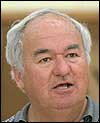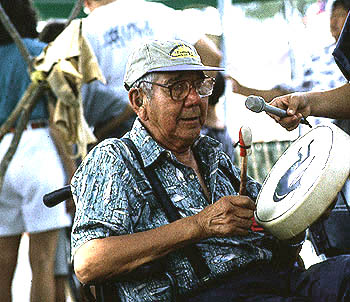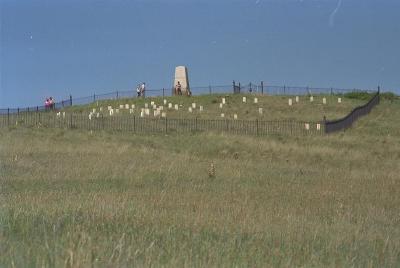|
Canku Ota |
|
(Many Paths) |
|
A Newsletter Celebrating Native America |
|
December 2, 2000 - Issue 24 |
|
|
|
This Date In North American Indian History |
|
from On This Date in North American Indian History at http://americanindian.net |
| Dec. 2, 1794: | A treaty is concluded today with the ONEIDA, TUSCARORA, and STOCKBRIDGE Indians, at Oneida, New York. The treaty is a gesture of thanks for the tribes help during the Revolutionary war. They will receive $5000 for damages suffered during the war. Grist and saw mills will be built, and salary for their workers will be provided for three years. They will receive $1000 to build a church. No further claims will be made by the tribes. The treaty is signed by Thomas Pickering for the United States, and by 11 Indians. |
| Dec. 3, 1973: | A new Commissioner of Indian Affairs is named today. Morris Thompson, an ATHABASCA from
Alaska gets the post. editor's note: Mr. Thompson, his wife, and daughter, were among the victims of Alaska Airlines Flight 261 that crashed Monday, Jan. 31, 2000, off the coast of Oxnard, CA. read more |
|
|
|
| Dec. 4, 1833: | Today, 21 CHICKASAW Chiefs arrive at Fort Towson, in eastern Indian Territory. They will assess the lands that the United States wants them to move to when they are removed from Alabama. Meeting with local CHOCTAWs about buying land from them will prove to be unfruitful. |
| Dec. 5, 1835: | Today, members of the Georgia Guard will arrest CHEROKEE Principal Chief John Ross at his home. Also arrested in historian John Howard Payne. Payne, the author of the song "Home, Sweet Home", was writing a history of the CHEROKEE people. They are be arrested so they will not be able to attend the "New Echota Treaty" conference. |
| Dec. 6, 1866: | Red Cloud, Crazy Horse, Yellow Eagle, and High Back Bone, and their followers, have been harassing Col.Henry Carrington's troops from Fort Phil Kearny, in northern Wyoming. Today, they will stage several raids and ambushes along the road from the fort to the nearby woods. Col.Carrington will lead his troops in some of the fighting today. Several soldiers will be killed in the fighting. Carrington is called "Little White Chief" by the Indians. The soldiers will call this the "Fetterman Massacre", the Indians will call it the "Battle of the Hundred Killed." |
| Dec. 7, 1855: | The WALLA WALLAs attack Nathan Olney's volunteers, who still hold Pio-pio-mox-mox, and 4 others, prisoners. Pio will resist being bound, and he and 3 of his men are killed. His scalp and ears will be paraded through white settlements. This action would move many neutral tribes to a war status. |
| Dec. 8, 1829: | Today, in his first "State of the Union Address," President Andrew Jackson will state his goal to remove all Indians in the southeastern part of the United States to lands west of the Mississippi. A law to that effect would pass Congress on May 28, 1830. |
|
|
|
| Dec. 9, 1805: | Lewis & Clark visit a CLATSOP village and observe the Indians gambling. |
| Dec. 10, 1991: | The Custer Monument name is changed to the Little Big Horn Battleground Monument. |
|
|
|
| Dec. 11, 1937: | "Undisposed of" land in the Flathead Indian Reservation in Montana which had originally been designated for lots in a townsite is returned to tribal ownership today. |
| Dec. 12, 1806: | Today, in what would eventually become Rome, Georgia, CHEROKEE Principal Chief Stand Watie was born. Watie would figure promenently in the CHEROKEE removal process. His brother, Buck Watie (Elias Boudinot), was the editor of the Cherokee Phoenix, and his uncle and cousin were Major and John Ridge. Stand Watie signed the Treaty of New Echota, cedeing all of the CHEROKEEs lands in the east for land west of the Mississippi River. Watie managed to escape the people who murdered his three famous relatives on June 22, 1839. Watie would eventually kill one of the men accused of killing his uncle. Watie would enlist as a Colonel in the Confereracy in 1861; and, he would fight in the Battle of Pea Ridge. Watie would be the last Conferate General to surrender. |
|
|
|
| Dec. 13, 1863: | Kit Carson is preparing to a campaign against the NAVAJOs in the Canyon de Chelly country. He has corralled a large herd of park mules for his supplies. Today, Barboncito, and NAVAJO warriors will steal most of the heard. Carson will be without pack animals, and the NAVAJOs will have plenty of meat for a while. |
| Dec. 14, 1886: | As of today, Indian language use is illegal in Mississippi schools. |
| Dec. 15, 1970: | Blue Lake will be returned to the TAOS PUEBLOs. |


